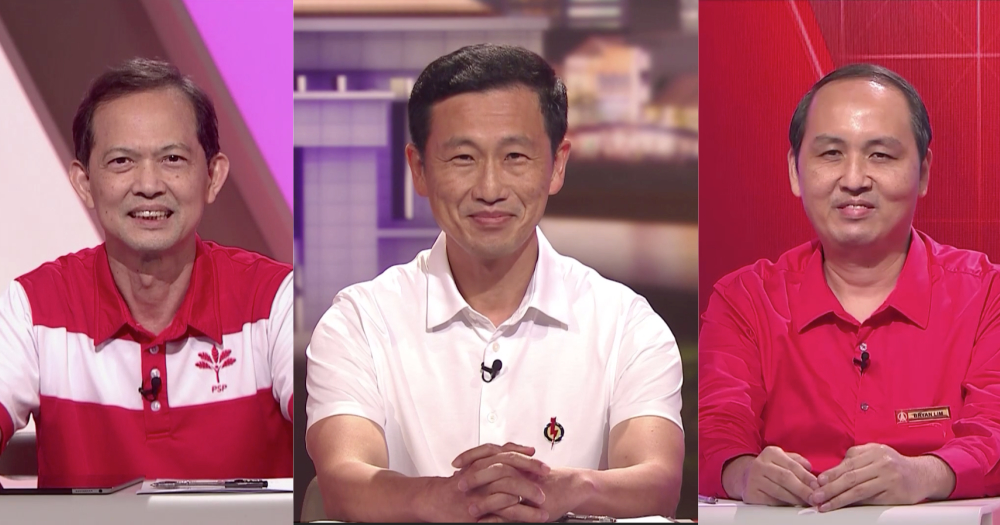Workers' Party's (WP) Jamus Lim has once again become an Internet sensation after his impressive performance at July 1's political debate.
Lim has also shared with Mothership yesterday (Jul 2) that he appreciated the exchanges with Vivian Balakrishnan [People's Action Party (PAP)], Francis Yuen [(Progress Singapore Party)(PSP)] and Chee Soon Juan [Singapore Democratic Party(SDP)].
Besides the English debate, there was a Chinese debate conducted on Channel 8 an hour later involving PAP's Ong Ye Kung, PSP's Leong Mun Wai and SDP's Bryan Lim on the same day (Jul 1).
Although it did not gain as much traction online like the English debate, the Chinese debate was reported on Lianhe Zaobao's front-page (Jul 2).
Compared to Vivian, Ong visibly had an easier time debating Leong and Lim.
While it was nothing like the English debates with sparks flying between participating politicians, it was nevertheless oddly interesting to watch how Ong parried off his challengers effortlessly.
For those who could not or did not watch the debate, here's a summary of what happened.
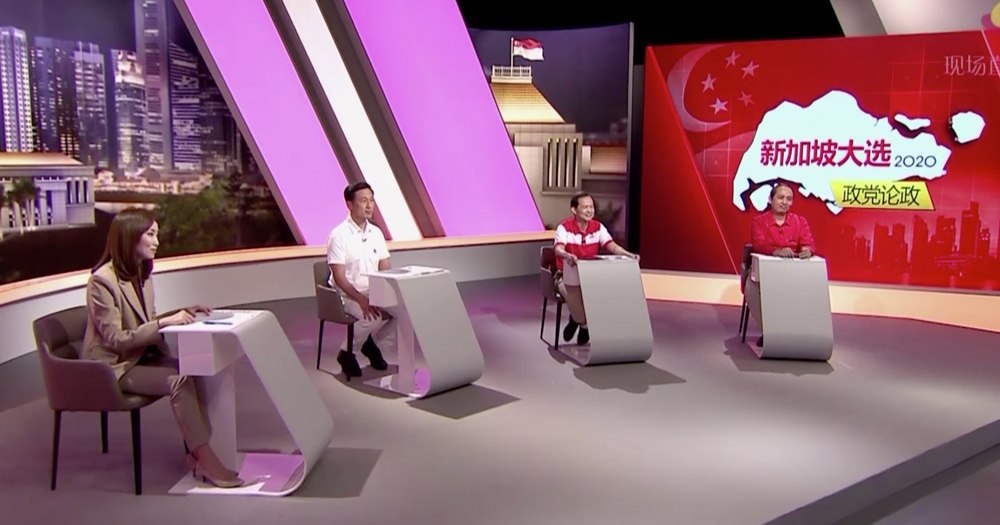 Screenshot via MeWatch.
Screenshot via MeWatch.
1. Participants' Command of Chinese
One stark contrast between Ong and the other two candidates is his command of the Chinese language.
Ong is visibly more comfortable in delivering his answers in Mandarin.
He spoke eloquently, looked at the camera most of the time, and even used metaphors and idioms in his replies.
Ong is perhaps one of the best Chinese speaking candidates from the PAP as he grew up from a Chinese speaking family.
He shared before that he read only Chinese comics and even entered Primary One without being able to speak or read much English.
PSP's Leong was able to deliver his replies with clarity most of the time, with occasional fillers and pauses. He was fluent but was not able to present his points with the level of sophistication like Ong.
Unfortunately, Lim's "broken sentences" and fillers in his responses made it hard for people to grasp what he was talking about sometimes.
Among the three candidates, Lim had to refer to the script from his phone, appearing to be translating parts of the party's manifesto on the go.
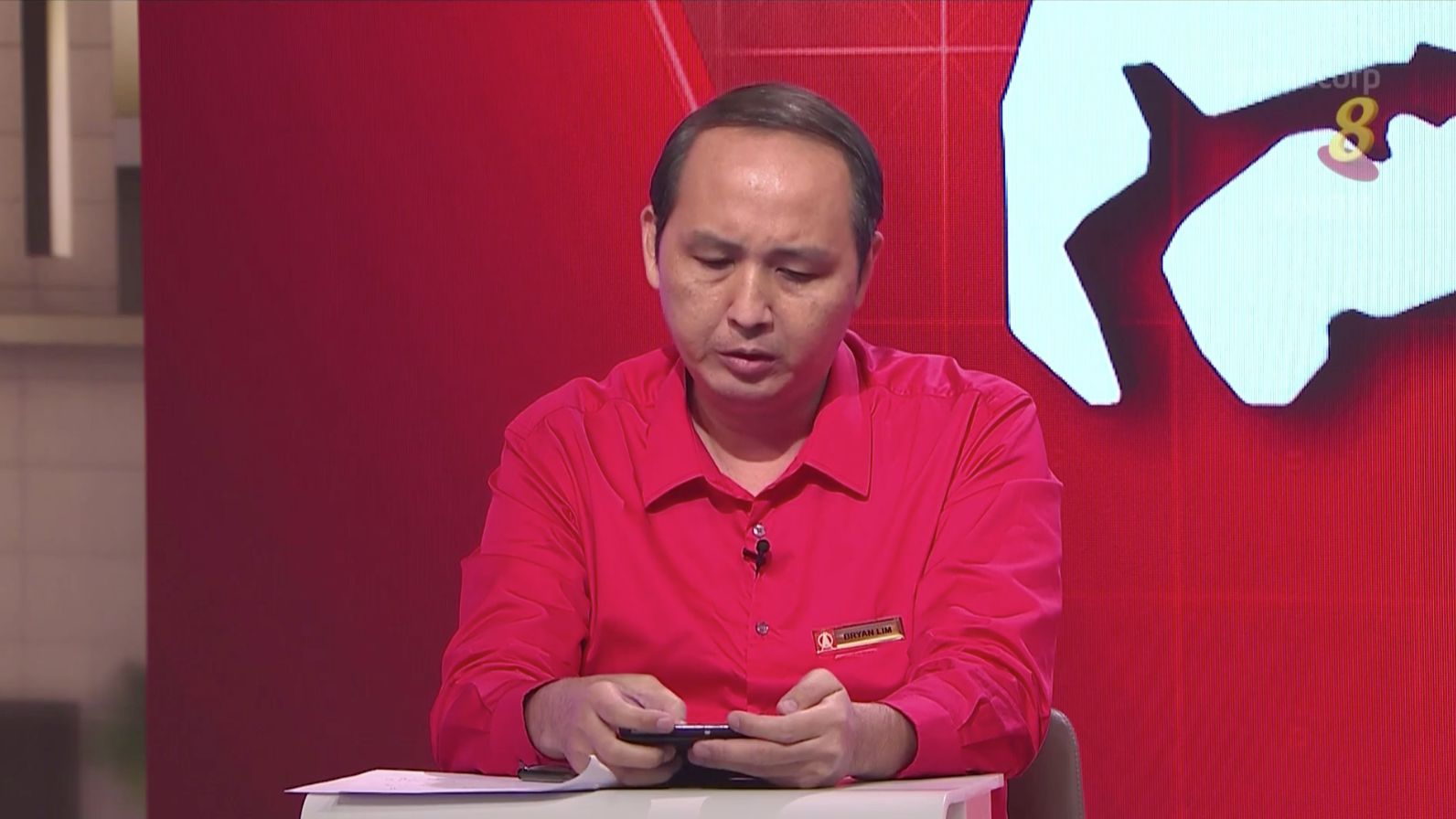 Screenshot via MeWatch.
Screenshot via MeWatch.
As a result of the sub-par delivery as compared to Ong and Leong, viewers were likely to lose interest in what Lim was saying, or worse, to lose confidence in him as a candidate.
Given that how the command of language will influence the perception of the party's candidate, it might have been a strategic move for the Workers' Party (WP) to not take the risk to send a candidate to this debate.
Both the WP chief Pritam Singh and chairman Sylvia Lim have apologised for not sending a candidate.
Pritam explained that while they have individuals in the party who can make speeches and communicate effectively with residents in Mandarin, the language proficiency required to participate in a live debate is higher.
2. The participants tried to persuade the audience on their own manifestos
The Chinese debate has the same format as the English debate.
The debate was live and has two segments, with moderator, Tung Soo Hua, posing the candidates three questions related to unemployment, helping businesses, and social mobility.
The candidates would naturally refer to their manifestos and would take the opportunity to convince the viewers to vote for them.PSP's Leong and SDP's Lim reiterated points from the parties' manifestos to answer the three questions but failed to engage the viewers.
All three candidates answered sufficiently to the first two questions on broad livelihoods, raising concerns and suggestions from their manifestos.
However, the last question on social mobility is relatively niche and it would have been better if Leong and Lim had attempted to justify how the policy recommendations that they had made would help to increase social mobility more.
In particular, Leong said that the country should introduce a minimum wage.
He also suggested giving all newborns S$500 payout annually until the child is 10 years old as well as to allow Singaporeans to take out S$50,000 from their Central Provident Fund (CPF) at the age of 55. He then explained that the amount of money can help people to plan for the long term without being caught up with the struggle to get by.
Lim said that SDP would fight for legislation to ensure all 65-year-old people will get S$500 payout every month. This retirement income, Lim said, will help relieve the sandwich generation from their living expenses.
"This is doable... because if the government can lend help, this will greatly reduce the burden," Lim concluded.
Ong also touched on what the incumbent party has proposed or implemented but he effectively weaved in metaphors and went beyond just ticking off the boxes from the manifesto.
Ong also showed considerations of a broader social issue such as the aging population, inequality as well as geopolitical factors that will influence the government's decision, which both Leong and Lim did not.
This brings me to the next point: Notable quotes from the debate.
3. Ong commanded the debate with a few punchlines
Ong dominated the Chinese debate with a few easy-to-remember analogies (the reshuffling of mahjong tiles, a small boat in a thunderstorm) and several notable quotes.
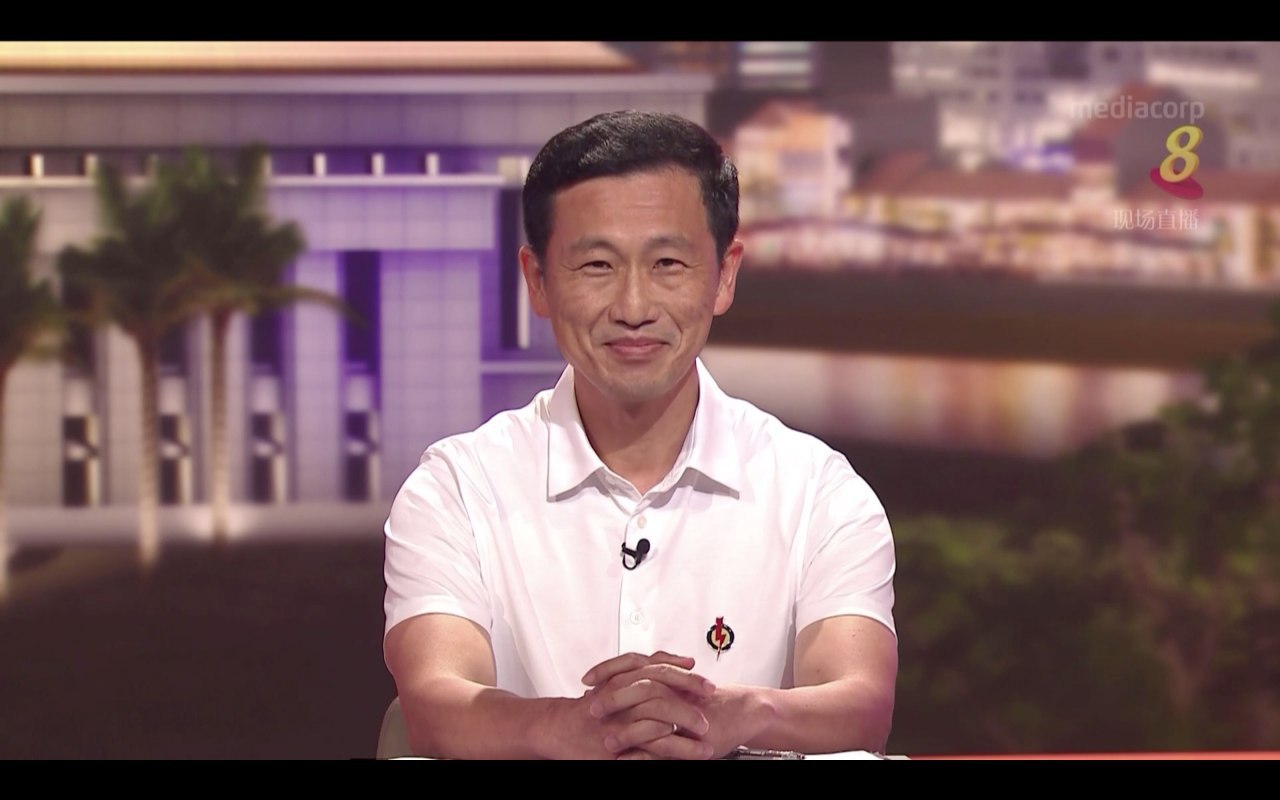 Screengrab from Mediacorp Channel 8.
Screengrab from Mediacorp Channel 8.
For example, Ong compared the global disruption to the reshuffling of mahjong tiles:
"However, the pandemic is a major global disruption and will cause a global reshuffle. Just like a game of mahjong, after the shuffle, where does Singapore stand?
The investors will think after this reshuffle, where should I invest and when they see Singapore, they are confident in Singapore because they know the government is farsighted and take care of the people.
There is a strong trust between government and people which brings along stability in society and politics. The tripartite partners are willing to work together and we can reorganise, innovate and upskill to become even more capable. At this juncture, how we perform is very important and let's not throw away these advantages just to shake the boat.
This is about survival, not just a game, please consider carefully."
Ong also described Singapore as a small boat in the midst of a thunderstorm and urged people not to shake the boat during this trying period.
He said:
"We are in a thunderstorm right now, Singapore is a small island state like a small boat that strives to navigate through this storm.
But during this storm, you passengers have to choose a captain and his crew. And I have three recommendations here on how to choose.
Firstly, I'd ask are the current captain and his crew corrupted and incompetent? Of course not, good governance in Singapore is well known in the world. Secondly, in terms of competency, the Singapore government is also internationally recognised for running the country and the economy. Thirdly, here's how we objectively and holistically evaluate the government's performance for Covid-19 management: We have single-digit community cases and outbreak in the workers' dormitories is now under control too. Moving on, our healthcare system is not under high stress, death rate is one of the lowest in the world.
We need an experienced captain right now. Is this the right time to shake the boat to destabilise it? No.
The pandemic is still ongoing, you can do a lockdown or implement restriction measures but these won't tackle the roots of the problem. Shaking the boat now will cause the boat to sink.
Is this the right time to reform and reflect on our policies? Of course, it is. But this has always been what the PAP is doing, to ensure our policies keep up with times. Our healthcare and economic situation depend on how we choose the captain and his/her team."
On social mobility, Ong said:
"Social mobility is a broader issue and I think promoting social mobility is one of our greatest successes in the past 55 years.
If we look around us, many of us were not very well to do before and now our children are living a better life than us. Each generation is leading a better life than the previous generation. This is social mobility and we have delivered.
Hence, many people are also giving back to society after benefiting from it. Promoting social mobility has been what we have been working on but this is also a never ending task. We now face new challenges."
4. Ong countered opposition's questions effortlessly
The second segment of the debate allowed the candidates to ask questions of other candidates in a structured sequence as well as answer questions posed to them by other candidates.
Ong's question to SDP's Lim was simple: How does SDP pay for all the proposals it listed?
Ong listed out SDP's recommendations which include 18-month retrenchment benefits and the retirement income.
SDP also called for the suspension of GST until end 2021.
So Ong asked Lim, "Where does your money come from?"
In response, Lim replied with a smirk, "Let's start from cutting the ministerial salaries?"
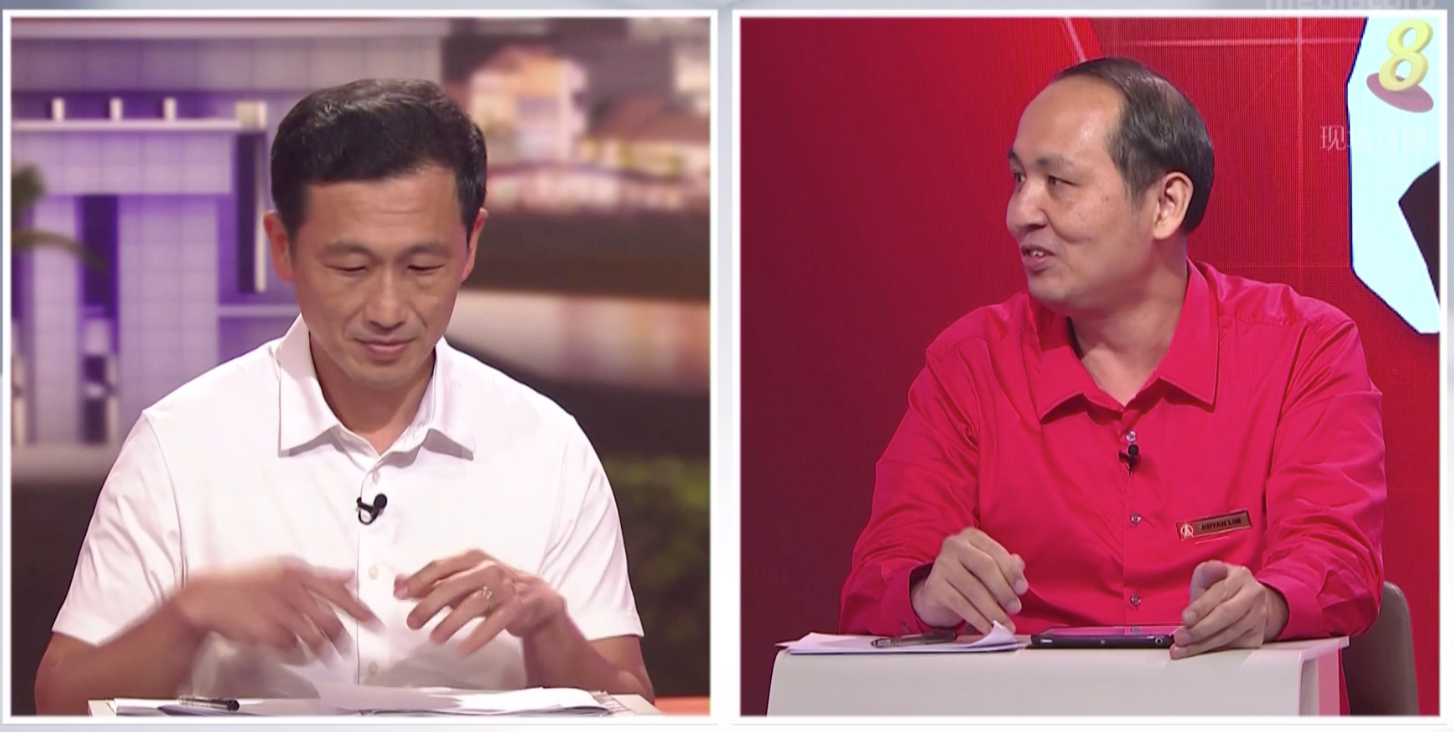 Screenshot via MeWatch.
Screenshot via MeWatch.
Lim then cited a study that the party conducted and added that the leaders should set an example and make sacrifices for the people to tide through this period together.
Lim added that big projects such as Changi Jewel are a waste of money as the people do not benefit from it.
When it's time for Lim to pose questions, Lim said that some SMEs told him that they did not receive the payouts before asking Ong to give a percentage of the subsidies given to big companies versus that to SMEs.
Ong explained that the aim of the WIS (Workfare Income Supplement scheme) is to protect people's jobs. Hence, they are subsidising companies with manpower costs so that they will not want to cut jobs.
"Big companies or small companies, as long as they hire people, they will get the benefits. What we want to do is to protect jobs, regardless of the size of companies. SMEs absolutely can benefit from the scheme. So Mr Lim, the SMEs you've heard that did not get the money, I'll suggest you pass me the details, we'll take a look."
On cutting Ministerial salaries', Ong said,
"You also mentioned that if ministers can cut their salaries, we will then have enough, we will be able to give more welfare benefits. The numbers actually don't work out...you are not making sense. You said if ministers cut their salaries, we can save S$10 million. When I look at refurbishing a primary school, it already takes about S$20-30 million. So after cutting ministers' salaries, you won't even get enough to refurbish a school. That's not the solution to the problem.
On Changi Jewel, that's another issue. Not building Changi Jewel will have significant impacts on our strategic position and competitiveness in the world."
5. Tone of the Chinese debate different from the English debate
Unlike the English debate, the mood and tone for the Chinese debate is respectful and less emotional.
Ong, Leong, and Lim were able to highlight their differences and disagree with each other respectfully.
They kept to their time in terms of questioning and replying, and did not need the moderator to intervene.
There were no raising of voices or interruption, or the need to call out "falsehoods".
More importantly, they spent some time listening carefully to each other's questions, before responding.
One also noticed Ong and Leong nodding at each other politely during the break.
Ong however emerged as the most persuasive candidate on television because he was able to condense complex issues into simple and clear analogies and soundbites.
At some point, it almost became like Ong's own national broadcast of the PAP manifesto, peppered with Leong and Lim's harder-to-understand rebuttals.
One almost wished that Ong can break more of a sweat in the debate, if only the Workers' Party had decided to send a candidate in the mould of Low Thia Khiang to debate him.
You can watch the video here.
Top image via screenshots of MeWatch
If you like what you read, follow us on Facebook, Instagram, Twitter and Telegram to get the latest updates.
